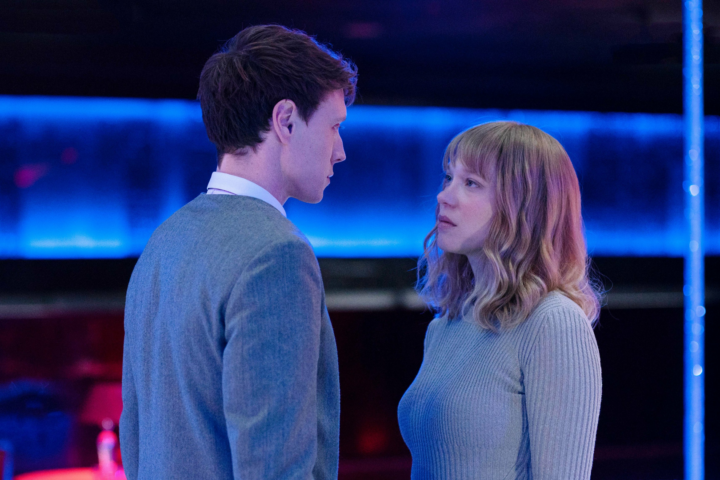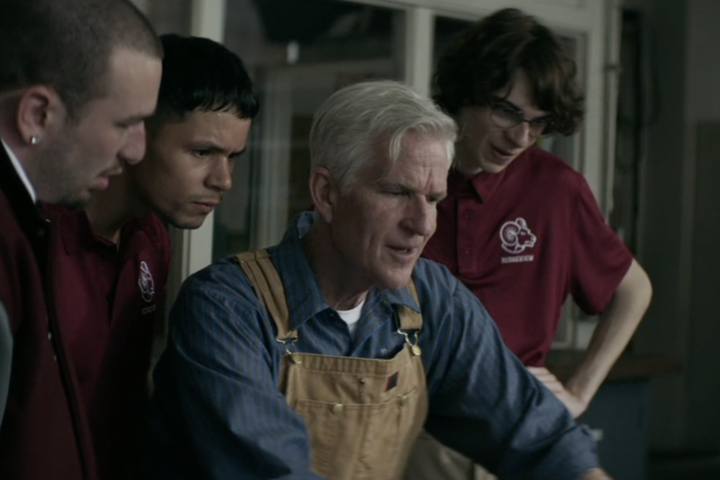A tale as old as time—or at least Hollywood—receives an electrifying new update in Bradley Cooper’s rousing A Star is Born, as vividly rendered, romantic and affecting a Hollywood picture as we’ve seen in ages. It may also be the best version of a story told no less than five times, including the classic 1954 version starring Judy Garland, whose spirit makes more than a fleeting appearance here.
Featuring Cooper and a galvanic Lady Gaga as updated versions of the classic Hollywood archetypes—the icon on the down slope and the ingenue primed to explode—it’s a rare commercial movie of immense pleasures, both sensual and pedigreed. Near the top of these is Cooper’s turn as a hard-drinking, pill popping country-rock superstar, the sort of career high—high wire, really—portrait that immediately vaults him to the front of this year’s Best Actor contenders. Did I mention he also sings, co-wrote the screenplay and music and directed this home run on his first shot?
Cooper’s take on Star’s revered industry myth is an Altman-esque, rough-edged marvel, a pull-no-punches character piece that works as an unabashed love story, an onstage and backstage drama and a serious meditation on the cost of celebrity on the soul. You can have it all, this knockout movie says, but not at the same time.
We first meet country-rock superstar Jackson Maine (Cooper) onstage downing a handful of pills before tens of thousands of screaming fans, a moment that sets the stage for his affliction and eventual downfall. A longtime music titan who self-medicates into a stupor, he’s also suffering from tinnitus and slowly going deaf.
Enter Ally (Gaga), a working-class hotel waitress on the late shift whose dreams of being a singer-songwriter play out as the only female singer in a drag bar where she performs a barn-burning rendition of La Vie En Rose, wowing its patrons, including the waylaid Jackson, who desperate for a drink ducks into the dive before being knocked flat by Ally’s voice and charisma. Gaga, standing atop the bar and kicking like a contemporary Liza in Cabaret, lies flat in close-up to the camera, looking right down the lens, seducing Jackson and us.
He’s immediately smitten in a love-at-first-sight way, and after a backstage visit—where Ally reluctantly peels off her false eyelashes—the pair bonds over a long night of drinks, bar fights and impromptu songwriting in a supermarket parking lot, the first of the movie’s many glimpses of artistic creation. “I think you might be a songwriter,” Jackson tells reluctant Ally, who’s been beaten down by an industry that’s discarded her girl-next-door looks (particularly Gaga’s famous Roman nose, which gets significant screen time and conversation). She doesn’t want to believe him because that would only lead to more disappointment. To Ally, what Jackson offers isn’t reality—she knows a drunk when she sees one.
Ally lives with her limo driving father, played by a soulful Andrew Dice Clay, a well-meaning parent who believes in his daughter’s talent but knows too well, from his own past-life experience as a would-be Sinatra, that talent isn’t always what is needed to make it. Translation—my brilliant daughter hasn’t got the look.
But after an altercation with her overbearing boss, Ally and confidante Ramon (Hamilton’s winning Anthony Ramos) accept Jackson’s backstage offer—and a flight on his private jet—where they are whisked stage left, followed by a sensationally thrilling performance that erupts as reticent Ally, at Jackson’s urging, steps onstage to duet the song they have only just written together. It’s a movie moment for the ages, and Gaga’s tremulous, eye-covered anxiety is believable and endearing. And then she unleashes that voice. The audience and YouTube go nuts, and a star is born before our eyes. The picture’s many concert scenes were shot live during Glastonbury and Coachella, allowing Cooper to keep the production budget at a trim $36m.
Anyone who knows this story—and most contemporary audiences are probably familiar with the turgidly overblown, 1976 Streisand-Kristofferson soap opera—understand that as something goes up, something else must come down. And after an exhilarating first hour of romantic and artistic collaboration, Ally’s solo career heats up in the hands of a slimy producer (Rafi Gavron) who turns her into an overnight pop sensation.
It’s possible to read A Star is Born as the ultimate parable of female liberation in the era of #metoo—a powerful man falls as a woman, finally claiming her voice, rises. Of course, this is inherent to the source material yet has a distinct zeitgeist in this moment. Unlike prior versions, Cooper gives himself a big-hearted, sensitive arc—he’s less jealous of Ally’s fortunes even as his own tumble—and more artistically disappointed in her choices and synthetic image, which features Sunset Blvd. billboards, a shock of dyed orange hair and vapid pop tunes that betray her genius.
“Maybe she’s a way out,” says longtime buddy Dave Chappelle, who comes to passed out Jackson’s aid. But if she is a way out, she’s a no-nonsense one, and Gaga plays Ally with a street smart edge. When she tells Jackson she won’t put up with his alcoholism, she means it. And we believe it.
Another contemporary update is a believable context for Jackson’s demons, notably a dark family history in which older brother and tour manager Bobby (a moving Sam Elliott) bears the brunt of his resentment. Unlike past versions, Cooper is careful to balance our compassion equally for both characters. Instead of being a troubled drunk, Jackson’s alcoholism is referred to as a disease and one that needs treatment.
Cooper, who perhaps enters auteur status with this confident film has, with cinematographer Matthew Libatique and Lady Gaga, delivered a passionate, big canvas movie that never forgoes intimacy even at its grandest scope, which may be a humiliating Grammys meltdown after Jackson is bumped from his Roy Orbison tribute while Ally remains the star of the show. Cooper is extraordinarily sympathetic here, saying volumes with his face—there’s a reaction shot of his steel blue eyes contemplating a late picture, scathing exchange with Gravron that nearly burns through the movie.
But it’s Lady Gaga who owns the movie, all freshness, open-heartedness, extraordinarily unaffected and new but with the knowledge that only the best actors have, a sense of preternatural listening and reacting that comes usually with years of working with a camera. And she gets it perfect on the first try. She famously signed on to play Ally only after Cooper agreed that all singing would be performed and shot live, with no post dubbing. The result is a you-are-there rawness, absence of any studio tricks.
As expected, Gaga home runs all of the musical numbers (she penned in collaboration with Cooper, Lukas Nelson and Jason Isbell), but she isn’t merely singing them. Her detailed work in songs like Always Remember Us This Way, The Shallow (a surefire Oscar winner) and the climactic power ballad I’ll Never Love Again is perhaps the finest acting through music we’ve seen in a movie. And she does dramatic heavy lifting in emotional scenes with Cooper, Clay and finally, Elliott, in an eloquent final exchange.
As a love story, all stops are pulled out, and the chemistry between the perfectly matched pair blossoms believably, running the gamut from the early euphoria of that parking lot scene to a baggage laden rehab reunion, which should seal Cooper’s Oscar.
As with all great films, A Star is Born isn’t exactly perfect—Ally’s transformation from sincere singer-songwriter to packaged pop confection feels somewhat rushed. If we learned one thing in the picture’s transcendent first half it’s that Ally has a no bullshit filter and the chops of a bona fide musician, so to see her so quickly sell out to an overproduced, stratospheric fabrication seems somewhat questionable, the nadir of which is a perfectly terrible pop song performed on SNL. Perhaps that’s the point. But we wonder, really if she might have raised stronger objections to such commercial Pygmalion-ism (although at one point she clarifies with Gavron that she “doesn’t want to lose the part that’s talented”). Such a transition, the movie says, is the price of commercial stardom.
So are mandatory appearance upgrades, backup dancers and insipid lyrics, for Jackson an unholy amalgam that leads to a scathing scene where he confronts a bathing Ally, knowing exactly where to zero in, nailing her insecurities with cruelty.
As Star is Born presents a cynical take on an industry that sacrifices all—talent, originality, love and even life—in favor of success. It’s one of the great movies about the symbiosis between the act of creating and its power to transform lives, careers and love. It also has the power to take them.
The picture concludes with what might be called sorrowful empowerment, Ally released to fulfill her destiny in the film’s penultimate final number, a weeper named I’ll Never Love Again that frames a montage containing a simple final moment of creation, two people at a piano, freed.
At its core, A Star is Born is inherent melodrama, but what Cooper has fashioned is something new—a melodrama delivered with realism and grit. It’s a neat trick, and makes A Star is Born the year’s best studio picture.
4 stars.



